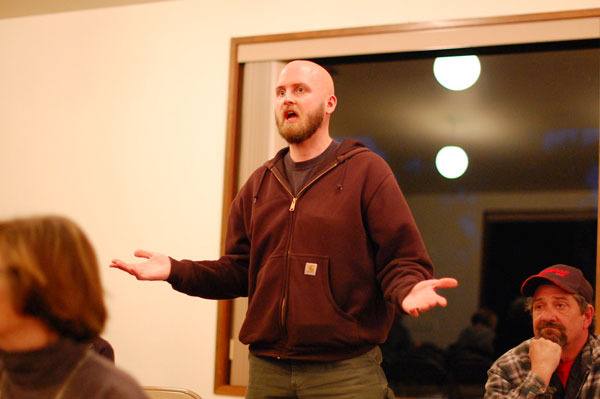Medical marijuana access points will not be allowed in Langley but the community will be a “safe haven” for qualified patients and those who follow state law, the city council decided at their regular meeting Monday.
Held at the Methodist Church on Third Street to accommodate an expected large crowd, the council made several decisions related to Freeland resident Lucas Jushinski’s recent application for a business license to open an access point in Langley.
Holding firm to a consensus reached at a March workshop, the council refused to budge from its position that adopting land use rules or issuing business licenses for such “businesses” would leave the city liable to federal prosecution or other legal problems.
Several council members addressed the issue, saying they had been optimistic that some city rules could be adopted. However, in the end the legal problems with such an enterprise proved too great a hurdle.
“To the best of my ability, after solid effort, I cannot see where it is in Washington law, that such an operation could exist in a legal fashion,” Councilman Doug Allderdice said.
While unwilling to adopt rules that would allow access points, such as the one proposed by Jushinski, the council was willing to take more passive action. First, it approved a resolution galvanizing the city’s support for the reclassification of marijuana on the federal level as a schedule 2 drug . It also agreed to ask the congressional delegation to pass legislation that would grant states the legal right to adopt their own medical cannabis laws, effectively ending the legal standoff over medical marijuana.
Finally, the council agreed with an executive order Mayor Larry Kwarsick presented that directed Langley police not to cite or arrest health care professionals, qualified patients or designated providers who follow existing state laws.
“Basically, this would be considered a safe haven,” Kwarsick said.
According to the mayor, the proposal outlined in Jushinski’s business plan would not be allowed. He argues that a “revolving door” concept that sidesteps the 10-member cap for collective gardens is not permitted by the state.
Jushinski was at the meeting and was visibly frustrated by the council’s decision. He said he had been led to believe by city officials on two occasions that this would pass and he didn’t find this reversal “very honorable.”
He said his hope from the beginning has been to provide a close and safe place to acquire medical marijuana for residents suffering from terminal and debilitating illnesses.
“I feel that supersedes any law you’re quoting,” Jushinski said.
“You really all should be ashamed of yourselves,” he said.
At least five people at the meeting spoke in support of Jushinski, several of whom said they were qualified patients in desperate need of a local access point. One unidentified elderly woman said there is no medicine for her illness and she has to commute to Mukilteo to acquire medical marijuana.
“I’m tired of doing that,” she said. “I’m about to move.”
“It’s ridiculous,” she said.
In a later interview, Jushinski confirmed that he would be moving ahead with plans to open a collective garden outside of city limits sometime in the next month but he declined to say where.
Qualified patients who want more information can reach him at info@islandalternative.com.



